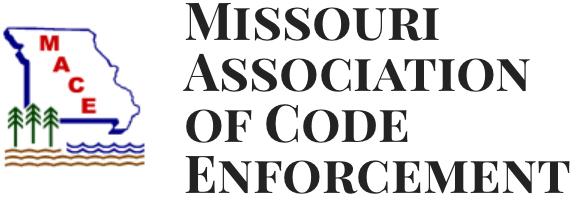Code enforcement officers in Missouri are dedicated community servants, working to enhance safety, beauty, and livability through education, collaboration, and voluntary compliance. At the Missouri Association of Code Enforcement (MACE), we believe that code enforcement is about building stronger communities, not punishing residents. This blog post highlights how officers prioritize community service, supported by MACE’s resources and mission to foster trust and cooperation.
Code Enforcement: A Commitment to Community Service
At its core, code enforcement is about serving the public. Officers uphold ordinances to ensure neighborhoods are safe, attractive, and thriving, as emphasized on MACE’s About page. Their work goes beyond issuing citations—it’s about partnering with residents to create environments where everyone can flourish. Key ways officers serve include:
- Protecting Safety: Ensuring properties meet safety standards to prevent hazards.
- Enhancing Neighborhoods: Addressing issues like clutter or unsafe structures to improve aesthetics.
- Supporting Residents: Guiding property owners toward compliance with empathy and resources.
By focusing on service, officers strengthen community bonds and promote a shared sense of responsibility.
Education as a Tool for Community Empowerment
Education is central to serving communities effectively. MACE is committed to equipping officers with knowledge to educate residents. This approach empowers property owners to understand and meet regulations willingly.
How Education Serves Communities
- Informing Residents: Clear explanations of ordinances help residents comply without conflict.
- Preventing Issues: Educating on code purposes, like weed control for pest prevention, reduces future violations.
- Fostering Trust: Officers who educate build rapport, making residents feel supported rather than penalized.
For example, an officer might visit a homeowner to discuss a fencing violation, explaining how proper fencing enhances safety and offering guidance on compliant solutions. MACE believes in a service-oriented approach.
Collaboration: Partnering for Community Success
Serving communities requires collaboration. Officers work with residents, businesses, and local agencies to achieve compliance that benefits all. MACE’s Code Resources & Links page provides tools like compliance guides to support these partnerships.
Collaborative Efforts in Service
- Engaging Property Owners: Officers listen to concerns and offer flexible solutions, such as phased repairs.
- Working with Local Government: Coordinating with city departments to streamline enforcement efforts.
- Leveraging MACE’s Network: Members access a community of professionals for shared strategies, as highlighted on our Membership page.
For instance, an officer might collaborate with a property owner to address a junk vehicle issue, connecting them with local resources to remove it, thus enhancing the neighborhood’s appeal and safety.
Prioritizing Voluntary Compliance for Community Good
MACE’s philosophy emphasizes voluntary compliance to serve communities effectively. By encouraging residents to comply willingly, officers create lasting improvements without confrontation.
Strategies for Voluntary Compliance
- Open Communication: Explaining regulations in a relatable way to gain cooperation.
- Resource Assistance: Connecting residents with services like landscaping or repair contractors.
- Positive Reinforcement: Recognizing compliant properties to inspire community-wide adherence.
This approach ensures that enforcement strengthens communities rather than divides them. Learn more about these strategies on our Blog.
Community Benefits of Code Enforcement
Code enforcement officers serve communities by creating safer, more inviting neighborhoods. Their efforts directly impact residents’ quality of life. Key benefits include:
- Enhanced Safety: Ensuring properties are free of hazards like faulty wiring or unstable structures.
- Improved Aesthetics: Maintaining clean, orderly properties boosts community pride.
- Economic Growth: Attractive neighborhoods draw businesses and residents, supporting local economies.
- Social Cohesion: Fair enforcement fosters a sense of fairness and shared purpose.
For example, addressing a dilapidated property not only improves safety but also uplifts the entire street’s appearance, serving the broader community.
Navigating Challenges to Serve Effectively
Serving communities through code enforcement comes with challenges, such as public resistance or limited resources. MACE supports officers through these obstacles with training and networking opportunities, as detailed on our Events page.
Common Challenges
- Public Misunderstandings: Some residents may see officers as enforcers, not educators.
- Resource Constraints: Budgets may limit access to training or technology.
- Regulatory Complexity: Keeping up with changing codes requires ongoing education.
MACE helps officers overcome these by offering resources and support. Join our community on the Membership page to access these tools and better serve your community.
MACE’s Role in Supporting Community-Focused Officers
The Missouri Association of Code Enforcement empowers officers to serve communities through education, resources, and professional connections. As an ICC chapter, MACE supports municipalities across Missouri. Member benefits include:
- Educational Programs: Workshops and certifications to enhance service skills.
- Networking Events: Opportunities to connect with peers at conferences and trainings.
- Practical Resources: Access to education via blog posts and other relative associations.
By joining MACE, officers can better serve their communities. Register on our Membership page to get started.
Becoming a Community-Serving Code Enforcement Officer
Ready to serve Missouri’s communities as a code enforcement officer? This rewarding career requires dedication and training. Steps to get started include:
- Education: A high school diploma is typically required; some roles prefer further education in public administration.
- Training: Enroll in programs through MACE or the International Code Council (ICC).
- Certifications: Earn credentials like the ICC Property Maintenance Inspector certification.
- Experience: Gain skills in related fields like construction or community planning.
- Join MACE: Access resources and job opportunities through our Membership page.
Explore current openings on our Jobs page to start your journey.
The Future of Community-Centered Code Enforcement
Code enforcement is evolving to better serve communities, with new tools and strategies enhancing effectiveness. MACE keeps officers prepared through training and communication. Emerging trends include:
- Technology Adoption: Using apps for efficient inspection and reporting.
- Community Engagement: Hosting public workshops to promote understanding of codes.
- Sustainable Practices: Supporting eco-friendly regulations, like green building standards.
By staying ahead of these trends, officers can continue serving communities effectively with MACE’s support.
Why Join MACE to Serve Your Community?
MACE equips officers to serve communities with excellence. Membership offers:
- Resources: Tools on our Resources page.
- Training: Professional development through events and workshops.
- Community: A network of peers to share service-oriented strategies.
Join MACE on our Membership page to enhance your ability to serve Missouri’s communities!
Conclusion
Code enforcement officers are vital to serving Missouri’s communities, prioritizing education, collaboration, and voluntary compliance to create safer, more vibrant neighborhoods. MACE supports this mission with resources, training, and a network dedicated to community well-being. Whether you’re an officer or aspiring to become one, join MACE on our Membership page to amplify your impact. Visit our Blog for more insights on serving communities through code enforcement.


